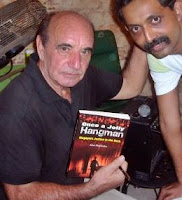Alan Shadrake (left), the British author charged for contempt of court for challenging the integrity and independence of Singapore's judiciary, said he wouldn’t apologize for his book on the city's death penalty.
"I want to have my day in court," he said after his trial was adjourned today to allow his lawyer more time to prepare a defense of fair criticism and fair comment. "I didn't spend 3 years writing the book only to run away," Shadrake said.
The 75-year-old writer is also being investigated for criminal defamation by Singapore authorities. His book "
Once a Jolly Hangman: Singapore's Justice in the Dock," suggests that the government "succumbs to political and economic pressures" in meting out the death penalty, the Attorney-General's Chambers said in court papers.
Shadrake can "tender an unreserved apology in unqualified terms," David Chong, chief counsel of the Attorney-General's civil division, said in court today. "Justification is no defense" for contempt of court, Chong
said.
Refusing to apologize would count as an "aggravating factor," the Attorney-General’s office said in a statement today. "An apology tendered to the court, if unqualified and sincere, may mitigate the punishment," according to the statement.
The book "insinuates that the Singapore judiciary is a tool of the People's Action Party to muzzle political dissent" through the award of "heavy damages in defamation actions brought without legal basis," the Attorney General's office said in the court papers. The book contains comments that imply the Singapore judiciary was "guilty of impropriety" by being "biased particularly against the weak, poor or less educated," according to the papers.
Contentious Statements
Shadrake's lawyer M. Ravi asked Justice Quentin Loh today to order Chong "not to put unnecessary fear in the media" after the prosecutor told journalists not to cite contentious statements from the book or risk being in contempt as well.
"I see quite a number of members of the media smiling," Loh said. "I don't think they're in fear."
Shadrake's book isn’t banned in Singapore, the Media Development Authority said in an e-mailed statement today. The regulator added that book retailers and distributors will have to seek legal advice on whether they can sell or distribute the book in the city-state.
“Singapore uses criminal defamation laws to silence critics of government policies," Amnesty International’s Asia Pacific Deputy Director Donna Guest said. "If Singapore aspires to be a global media city, it needs to respect global human rights standards for freedom of expression."
The Singapore police have said that Shadrake’s anti-death penalty views are not the issue in its investigations.
Singapore's Laws
"It is his violation of the laws of Singapore which are," the police said. "Those who disagree with our position have presented their arguments and as a matter of principle, we respect their right to hold such opposing views, as we hope they do ours."
The city-state, which has one of the world’s lowest crime rates according to the United Nations Office on Drugs and Crimes, imposes a death penalty for offenses including murder and drug trafficking.
Singapore in 2008 expanded the scope of free speech including allowing outdoor public demonstrations without police permits at designated areas and eased restrictions on political films. Prime Minister Lee Hsien Loong said in August 2008 the moves were to "liberalize our society, widen the space for expression and participation."
Contempt of court carries a jail sentence, a fine, or both. No maximum penalty has been specified under Singapore's constitution, according to the Attorney General's office.
Previous Cases
In March 2009, Singapore's High Court fined a senior Wall Street Journal editor S$10,000 ($7,300) for the publication of 3 articles that the city-state’s government said showed contempt of its judiciary. Three activists were sentenced to between 7 and 15 days in prison for wearing t-shirts with pictures of a kangaroo dressed as a judge in another contempt of court lawsuit.
Dressed in a sand-colored linen suit, Shadrake waved to the gallery as he entered the court earlier and showed the thumbs up sign. His lawyer told the court that Shadrake suffers from a heart condition and hypertension and has been “put to severe stress,” because of the trial and criminal defamation investigation.
Shadrake told reporters outside the court the case has helped his book, now in its third printing, "sell like hot cakes." The Singapore government has "blown me up into an international celebrity," he said. "Before, I was just an unknown poor journalist."
The case is Attorney-General vs Alan Shadrake OS720/2010 in the Singapore High Court.
Source: Bloomberg News, July 30, 2010










